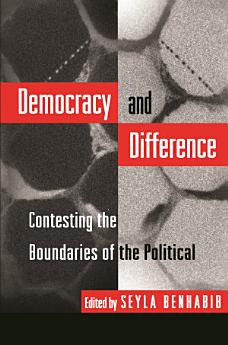Democracy and Difference: Contesting the Boundaries of the Political
Seyla Benhabib
আগ ২০২১ · Princeton University Press
ইবুক
384
পৃষ্ঠা
family_home
যোগ্য
info
reportমূল্যাংকন আৰু পৰ্যালোচনা সত্যাপন কৰা হোৱা নাই অধিক জানক
এই ইবুকখনৰ বিষয়ে
The global trend toward democratization of the last two decades has been accompanied by the resurgence of various politics of "identity/difference." From nationalist and ethnic revivals in the countries of east and central Europe to the former Soviet Union, to the politics of cultural separatism in Canada, and to social movement politics in liberal western-democracies, the negotiation of identity/difference has become a challenge to democracies everywhere. This volume brings together a group of distinguished thinkers who rearticulate and reconsider the foundations of democratic theory and practice in the light of the politics of identity/difference.
In Part One Jürgen Habermas, Sheldon S. Wolin, Jane Mansbridge, Seyla Benhabib, Joshua Cohen, and Iris Marion Young write on democratic theory. Part Two--on equality, difference, and public representation--contains essays by Anne Phillips, Will Kymlicka, Carol C. Gould, Jean L. Cohen, and Nancy Fraser; and Part Three--on culture, identity, and democracy--by Chantal Mouffe, Bonnie Honig, Fred Dallmayr, Joan B. Landes, and Carlos A. Forment. In the last section Richard Rorty, Robert A. Dahl, Amy Gutmann, and Benjamin R. Barber write on whether democracy needs philosophical foundations.
In Part One Jürgen Habermas, Sheldon S. Wolin, Jane Mansbridge, Seyla Benhabib, Joshua Cohen, and Iris Marion Young write on democratic theory. Part Two--on equality, difference, and public representation--contains essays by Anne Phillips, Will Kymlicka, Carol C. Gould, Jean L. Cohen, and Nancy Fraser; and Part Three--on culture, identity, and democracy--by Chantal Mouffe, Bonnie Honig, Fred Dallmayr, Joan B. Landes, and Carlos A. Forment. In the last section Richard Rorty, Robert A. Dahl, Amy Gutmann, and Benjamin R. Barber write on whether democracy needs philosophical foundations.
লিখকৰ বিষয়ে
Seyla Benhabib is Professor of Government at Harvard University. She is the author of Critique, Norm, and Utopia; Situating the Self: Gender, Community and Postmodernism in Contemporary Ethics; and The Reluctant Modernism of Hannah Arendt.
এই ইবুকখনক মূল্যাংকন কৰক
আমাক আপোনাৰ মতামত জনাওক।
পঢ়াৰ নির্দেশাৱলী
স্মাৰ্টফ’ন আৰু টেবলেট
Android আৰু iPad/iPhoneৰ বাবে Google Play Books এপটো ইনষ্টল কৰক। ই স্বয়ংক্রিয়ভাৱে আপোনাৰ একাউণ্টৰ সৈতে ছিংক হয় আৰু আপুনি য'তে নাথাকক ত'তেই কোনো অডিঅ'বুক অনলাইন বা অফলাইনত শুনিবলৈ সুবিধা দিয়ে।
লেপটপ আৰু কম্পিউটাৰ
আপুনি কম্পিউটাৰৰ ৱেব ব্রাউজাৰ ব্যৱহাৰ কৰি Google Playত কিনা অডিঅ'বুকসমূহ শুনিব পাৰে।
ই-ৰীডাৰ আৰু অন্য ডিভাইচ
Kobo eReadersৰ দৰে ই-চিয়াঁহীৰ ডিভাইচসমূহত পঢ়িবলৈ, আপুনি এটা ফাইল ডাউনল’ড কৰি সেইটো আপোনাৰ ডিভাইচলৈ স্থানান্তৰণ কৰিব লাগিব। সমৰ্থিত ই-ৰিডাৰলৈ ফাইলটো কেনেকৈ স্থানান্তৰ কৰিব জানিবলৈ সহায় কেন্দ্ৰত থকা সবিশেষ নিৰ্দেশাৱলী চাওক।





